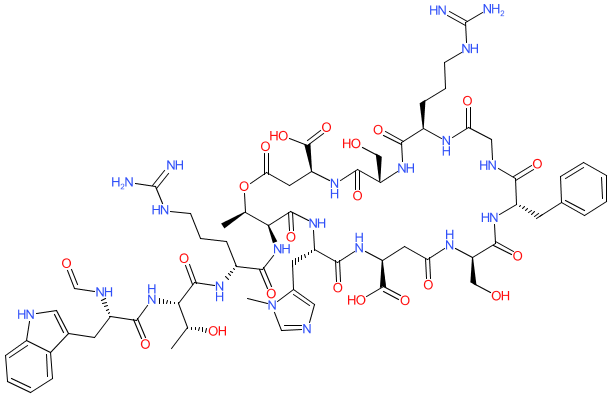|
Synonyms: GLXC-26146
Compound class:
Natural product
Comment: Evybactin is a novel cyclic depsipeptide DNA gyrase inhibitor produced by Photorhabdus noenieputensis, with potent antibacterial activity that is selective for Mycobacterium tuberculosis [ 1].
|
|
2D Structure
|

|
Physico-chemical Properties
|
|
|
Hydrogen bond acceptors
|
42
|
|
Hydrogen bond donors
|
24
|
|
Rotatable bonds
|
32
|
|
Topological polar surface area
|
662.22
|
|
Molecular weight
|
1488.52
|
|
XLogP
|
-4.92
|
|
No. Lipinski's rules broken
|
4
|
Generated using the Chemistry Development Kit (CDK) (Willighagen EL et al. Journal of Cheminformatics vol. 9:33. 2017, doi:10.1186/s13321-017-0220-4; https://cdk.github.io/)
|
SMILES / InChI / InChIKey
|
|
|
Canonical SMILES
|
C[C@H]([C@@H](C(=O)N[C@H](CCCNC(=N)N)C(=O)N[C@H]1[C@@H](C)OC(=O)C[C@@H](C(=O)O)NC(=O)[C@H](CO)NC(=O)[C@@H](CCCNC(=N)N)NC(=O)CNC(=O)[C@H](CC2=CC=CC=C2)NC(=O)[C@@H](CO)NC(=O)C[C@@H](C(=O)O)NC(=O)[C@H](CC3=CN=CN3C)NC1=O)NC(=O)[C@H](CC4=CNC5=C4C=CC=C5)NC=O)O
|
|
Isomeric SMILES
|
C[C@@H]1[C@@H](C(=O)N[C@H](C(=O)N[C@@H](CC(=O)N[C@@H](C(=O)N[C@H](C(=O)NCC(=O)N[C@@H](C(=O)N[C@H](C(=O)N[C@@H](CC(=O)O1)C(=O)O)CO)CCCNC(=N)N)CC2=CC=CC=C2)CO)C(=O)O)CC3=CN=CN3C)NC(=O)[C@@H](CCCNC(=N)N)NC(=O)[C@H]([C@@H](C)O)NC(=O)[C@H](CC4=CNC5=CC=CC=C54)NC=O
|
|
InChI
|
InChI=1S/C64H89N21O21/c1-31(89)50(83-55(96)40(74-30-88)20-34-24-72-37-14-8-7-13-36(34)37)59(100)77-39(16-10-18-71-64(67)68)54(95)84-51-32(2)106-49(92)23-44(62(104)105)81-58(99)46(28-87)82-53(94)38(15-9-17-70-63(65)66)75-48(91)26-73-52(93)41(19-33-11-5-4-6-12-33)78-57(98)45(27-86)76-47(90)22-43(61(102)103)80-56(97)42(79-60(51)101)21-35-25-69-29-85(35)3/h4-8,11-14,24-25,29-32,38-46,50-51,72,86-87,89H,9-10,15-23,26-28H2,1-3H3,(H,73,93)(H,74,88)(H,75,91)(H,76,90)(H,77,100)(H,78,98)(H,79,101)(H,80,97)(H,81,99)(H,82,94)(H,83,96)(H,84,95)(H,102,103)(H,104,105)(H4,65,66,70)(H4,67,68,71)/t31-,32-,38-,39-,40+,41+,42+,43+,44+,45-,46+,50+,51+/m1/s1
|
|
InChI Key
|
WUDFNHIMHPHZCA-RMKJKUPCSA-N
|
Generated using the Chemistry Development Kit (CDK) (Willighagen EL et al. Journal of Cheminformatics vol. 9:33. 2017, doi:10.1186/s13321-017-0220-4; https://cdk.github.io/)
|
|

